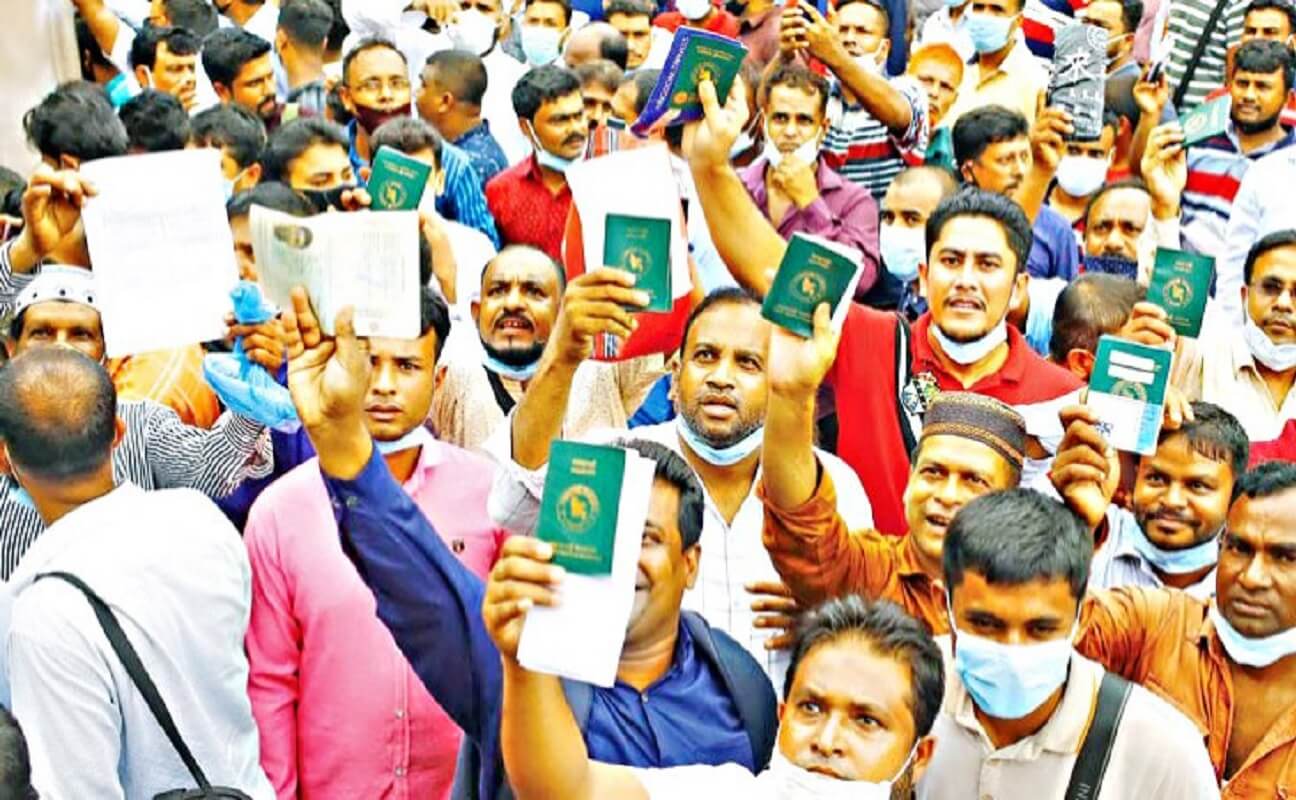FALSE PROMISES: Migrant workers in Middle East
Ajmain Zahin | 25 June 2023
FOR years, poverty and limited job opportunities have driven a significant number of Bangladeshis to seek employment overseas. According to the International Labour Organisation’s Bangladesh site, an average of over 400,000 Bangladeshis leave the country each year for livelihoods abroad. This trend is further supported by data from Bangladesh’s Bureau of Manpower, Employment, and Training, which indicates a consistent rise in overseas employment, except for the temporary decline during the pandemic years.
In some instances, the numbers have even exceeded 700,000 to a million citizens leaving the country annually. The Middle East continues to be the most popular destination, with 36 per cemnt migrating to Saudi Arabia, followed by 17 per cent to the United Arab Emirates and 12 per cent to Oman. While this migration may initially offer hope to those struggling in Bangladesh, it is important to acknowledge the drawbacks. Reports of horrendous working conditions, low wages, and inhumane abuse of these labourers regularly makes the headlines. What may seem like an opportunity for a better life often turns into a trap from which escape is nearly impossible.
When Bangladeshis hear of job opportunities abroad offering triple the wages that they receive at home, they are enticed by the deceptive promises made by recruitment agencies working with employers in the Middle East. Unfortunately, migrants are often unaware of the harsh realities that await them. On their arrival in the Gulf states, their passports are immediately seized by their employers, initiating their entrapment within the oppressive ‘kafala’ or ‘sponsorship’ system. This system grants employers an absolute control over the migrants’ movements, effectively trapping them and preventing job mobility. In a grave injustice, their fundamental freedoms and rights are ruthlessly snatched away, leaving them with scant options for escape or redress.
Migrant workers in the Middle East, primarily engaged in construction, face not only the inherent dangers of the job but also dire circumstances that exceed expectations. Labourers in the Middle East endure gruelling, non-stop work with minimal provisions and are left to fend for themselves. They toil for hours without breaks, knowing that any slacking off will result in punishment. This relentless labour, combined with extreme conditions, often leads to heat strokes, brain strokes, heart attacks, and, tragically, even death, particularly among those in their late twenties or early thirties.
The living conditions assigned to these workers resemble overcrowded and unsanitary camps or prisons, situated far from city centres and accommodating thousands of foreign labourers. In such environments, basic utilities are often lacking, exacerbating the risk of disease transmission. With limited access to medical assistance, illnesses spread rapidly among the close-knit community.
Moreover, these labourers not only receive a fraction of their promised wages but also have a portion of that already meagre amount deducted by the recruitment agencies responsible for their predicament. In a recent report by Human Rights Watch in May 2023, titled ‘Gulf States: Migrant Workers at Serious Risk from Dangerous Heat’, the challenges faced by these workers are extensively documented. The report includes first-hand accounts from migrants, describing their lives in what can only be characterized as ‘modern-day slavery’.
Migrant workers in the hospitality and domestic service sectors face similar challenges, with even graver consequences for female workers. Female migrants, in particular, endure widespread abuse from their employers, ranging from mistreatment and physical violence to sexual exploitation. The severity of the mistreatment often pushes these women to escape their captors. Still, the trauma they experience can have long-lasting mental repercussions, sometimes leading to years of suffering or tragically, even suicide.
In a world driven by profit, the nations benefiting from the exploitation of these workers often show little concern for the well-being of those affected. Despite the pressure exerted by human rights organisations and governments, some progress has been made, such as the abolition of the kafala system in Qatar and Bahrain, as well as the introduction of minimum wage regulations for migrant workers in certain countries. However, the ineffective enforcement of these measures has done little to bring about substantial improvements. It begs the question why Bangladesh, the home country of these vulnerable workers, is not taking stronger action to protect its citizens?
The harsh reality is that migrant workers are a significant source of revenue for Bangladesh through remittances, amounting to nearly $20 billion, as reported by the Bureau of Manpower, Employment, and Training. This makes Bangladesh the eight largest recipient of remittances in 2022, according to the World Bank’s KNOMAD, or the Global Knowledge Partnership on Migration and Development.
However, the government’s hesitation to take strong action against injustices faced by workers is fuelled by the fear of losing out on financial gains if companies in the Middle East seek labour elsewhere. Consequently, private recruitment agencies continue to operate without proper regulation or monitoring, trapping citizens with false promises. While prioritising money over human lives should never be acceptable, it sadly reflects the reality we are confronted with.
The plight of migrant workers in the Middle East reflects a tragic reality where human lives are reduced to mere tools for generating wealth. Looking at the issue from a financial perspective reveals that several solutions align with the economy’s best interests. Providing more and better-paying job opportunities within Bangladesh would reduce the need for citizens to seek work abroad. Additionally, addressing the root causes of poverty is crucial to helping the most vulnerable escape its vicious cycle.
Recognising that our greatest asset lies in our skilled and educated population, we should focus on training and empowering our workers to contribute to the country’s advancement and global reputation. Supporting local skilled workers and entrepreneurs will create jobs, foster economic growth, and, in return, offer a clear path to solving this issue of concern.
Ajmain Zahin, Junior Intern, Centre for Governance Studies.
This article was originally published on New Age
Views in this article are author’s own and do not necessarily reflect CGS policy.
